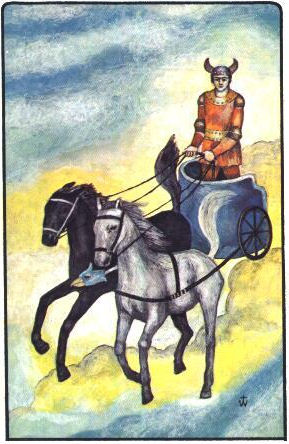Blessed are the meek: for they shall inherit the earth. (Matt. 5:5)

Those lacking in spiritual insight can only understand this beatitude in human terms. They understand meekness as something weak, timid, and passive. In contrast, they praise the earthy man with strong appetite and passionate nature. Both of these points of view reflect an inadequate notion of man. One reflects a Marxist view of an underclass motivated by resentment; the other, a modern neopagan caricature. When the real constitution of man is understood, it takes on a different meaning.
Powers of the soul
Plato describes the three aspects or powers of the soul:
- Intelligent aspect (logikos): this pertains to the intellect, which is the highest faculty in man by which he knows God or the essence of things by direct apprehension
- Appetitive aspect (eros): the soul’s desiring power
- Incensive aspect (thymos): the force provoking vehement feelings, often anger. Another word for someone dominated by this aspect is “spirited”, not to be confused with “Spirit”
In the Chariot Allegory, the soul is portrayed as a charioteer (the Intellect) controlling two horses. The white one represents the thymos and the black one, the appetitive aspect. The latter is the aspect most susceptible to the influence of the passions and hence is more difficult to control. Even the former can erupt into useless anger.
Nevertheless, both lower aspects, including spiritedness, must be under the control of the intellect in order for the soul to continue its ascent. Vladimir Solovyov, in his Lectures on Divine Humanity puts it this way: “One can be considered free from passions only when one has them but has power over them, when one possesses, but is not possessed by them.”
In Matthew, the word translated as “meek” is praos, which was also used to mean the gentling of a horse. The horse is the most noble of animals, but it must be broken to be of use to the knight.
So we see that the meek are those whose souls are under the control and guidance of the Intellect, since the appetitive and incensive aspects of the soul have been broken and put in service to the highest aspect in man. They still retain their driving forces: the appetitive to achieve a goal, and the incensive to provide the emotional energy and motivation to persist. Far from being mousy or timid, the meek are strong willed and inner directed. This is why they shall inherit the earth.
I always appreciate your comments.
I don’t believe this post even addressed the question of “love”, though the topic is certainly planned.
Jesus said, “if you love me, you will obey my commandments.”
There is an awful lot there. Without getting ahead of a planned future post:
1) There must be an intellectual understanding of the good, i.e., the commandments
2) There must be power to obey the commandemts (that is, manifest the Good)
Building on ideas from Solovyov: for the pagan (Plato), it was enough to contemplate the Good, in effect, as object.
The Christian idea is that the Good is also Subject. A subject involves the Will, and Love is to Will the Good, not just contemplate it. So, yes, Love is also Power. But it is Power conscious of itself, whereas the Will-to-Power in itself is blind and unconscious.
That is what I am getting at in the meaning of “meekness” … the integral person must not only Know the Good above him, he must have power over what is below him, in order to “obey” that Good that he knows. According to Tomberg, matter is objectified Will, so the issue of Power is always present. The question is whose Will? Is it a conscious Willing of the Good, which is Love? Or something spontaneous, deterministic, and blind?
I hesitate to comment. Poor web access among other probems makes my assimilation of your very interesting site poor for the moment.
But if you are interested in any initial impressions under the heading of HALF FORMED
I will offer this.
Reading you leaves me strongly with the Second Arcanum of the Seated Woman. The correction the author of a meditation on that Arcanum gives regarding St Yves Alvedrye ( in the DeMaistre stream …)
A concern the author had in mind I think of prioritising either intellect or power over love, that was so common.
I repeat: I am operating on half formed possibly half baked impressions
Vey, very interesting Charles. You will hear from me privately this weekend …
You are confusing the intellect in this sense — the ancient and traditional sense — with the ordinary mind. The twin horses of desire and passion are unruly. unless put under the control of the intellect. Of course, the intellect is oriented toward the whole, toward God, though it is barely aware, typically. Love is desire and passion made self-conscious.
The meek will inherit the earth…but I wonder what happens to those who let the intellect “rule”…without hearing the notes of love…or worse yet…misinterpreting those notes – not hearing the correct melody? Christ talks about those who are meek, -but only those who first seek God – and walk in a relationship with Him will really ever discover and inherit the kingdom of God.